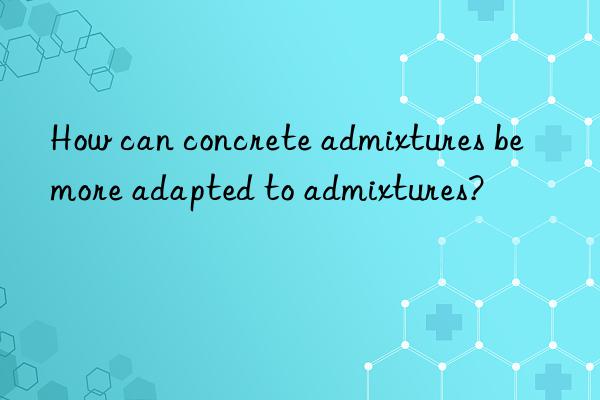
Concrete admixtures are placed in cement and concrete. They are added in order to make concrete and cement better to use. However, due to issues such as the type and amount of admixtures, when they are added to cement and concrete, the two cannot be well integrated and adaptable. This is a common problem in the use of admixtures. When this problem occurs, we It needs to be solved, so how to make the admixture more suitable for cement?
⑴ It is advisable to start by testing the pH value of the lime used in the plan, which is the alkalinity of the lime. The experimental results allow us to preliminarily judge whether the amount of soluble alkali in the lime is large or small; whether the mixed materials in the lime contain alkaline materials or stone powder inert materials that make the pH value low. This task can be accomplished with pH test paper, but it is better to use a pH meter. The normal pH value should be above twelve, but some ordinary silica limes are only nine to ten, and usually even lower. You can dissolve one part of lime with three parts of water, stir thoroughly and precipitate to clarify. Take a drop of the clear liquid and place it on a general pH test paper, and observe the degree of change of color on the back of the test paper to determine the acidity of the lime.
⑵The data from this department can help us choose the type of retarder. It would be fine if we could get the clinker comprehensive results for any recent day. Minerals that react with lime compliance are tricalcium aluminate, tricalcium silicate, and tetracalcium aluminoferrite. Fluorescent quick synthesis of clinker is done once per shift, and there is an average value once a month. Although it cannot be written on the lime certificate, it does not leak confidential information once. How to make concrete admixtures more compatible with cement? In addition, based on the alkali and sulfur content data in the clinker synthesis, we can calculate the plasticization degree SD, which can be used as a reference for adding sulfate or alkali appropriately when compounding additives. . The first part of the investigation is to obtain the clinker comprehensive effect of this kind of lime through appropriate methods.
⑶ The closer the dosage of high-efficiency superplasticizer is to the full dosage of lime, the easier it is to lose good adaptability. According to experience, the dosage of water-reducing agent is less than 70% of the full dosage. Even if multiple retarders are used to adjust the adaptability at the same time, satisfactory results cannot be achieved. However, the full dosage point of early-strength lime is generally higher, making traditional high-efficiency water-reducing admixtures exceed 1% or 0.8%, which is generally not more than 2.5% for pumping agents. Generally speaking, it is impossible to achieve the full dosage, and it is not even close to it. It mainly relies on the compounding of different high-efficiency water-reducing agents and compounding with a variety of retarders to achieve adjustment adaptability. Find the full dosage value of the high-efficiency water-reducing agent used for this kind of lime. If two or more kinds of high-efficiency water-reducing agents are mixed, find the full dosage point through the lime slurry test according to the total amount of the mixture.
</p



 微信扫一扫打赏
微信扫一扫打赏
